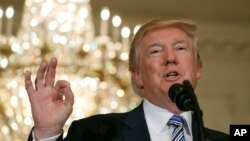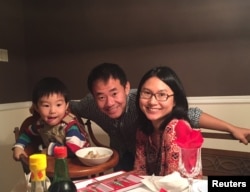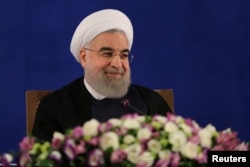U.S. President Donald Trump is warning Iran to release American citizens detained in the Islamic Republic, saying if it does not he is "prepared to impose new and serious consequences."
A White House statement Friday said Trump is willing to take new measures "unless all unjustly imprisoned American citizens are released and returned."
The comments come after a Chinese American, Xiyue Wang, was sentenced in Iran this week to 10 years in prison on spying charges.
"The United States condemns hostage takers and nations that continue to take hostages and detain our citizens without just cause or due process," the White House statement said.
The statement mentioned Wang by name along with Robert Levinson, an American former law enforcement officer who disappeared more than 10 years ago in Iran. It also demanded Iran release U.S. businessman Siamak Namazi and his father, Baquer.
"Iran is responsible for the care and well being of every United States citizen in its custody," the White House statement said.
The announcement capped a week of U.S. statements against Iran. On Monday, the Trump administration announced it would keep in place an international nuclear agreement between Iran and world powers which lifted sanctions against Tehran. However, senior administration officials said Tehran was violating the "spirit of the agreement" and pledged to seek tougher enforcement of the deal going forward.
Sanctions
On Tuesday, the administration put new economic sanctions against Iran over its ballistic missile program and said Tehran's "malign activities" in the Middle East undercut any "positive contributions" coming from the 2015 nuclear accord.
The State Department sanctioned two groups linked to Iran's elite Revolutionary Guards, saying they were involved in ballistic missile research and development and test flights.
The Treasury Department also sanctioned seven entities and five individuals for their support of Iranian military purchases, plus what it described as an "Iran-based transnational criminal organization" and three people linked to the group.
The sanctions freeze any assets the targeted Iranians might have in the U.S. and block Americans from doing business with them.
Iranian President Hassan Rouhani responded to the new sanctions by saying "We will stand up to the United States." Without elaborating he told a Cabinet meeting, "The great nation of Iran will have an appropriate answer."
Nuclear deal
The Iran nuclear deal, formally known as the Joint Comprehensive Plan of Action, was agreed to in 2015 following negotiations between Iran and a group that included the United States, Britain, France, China, Russia and Germany.
Under terms of the agreement, Iran gained relief from sanctions targeting its nuclear activity in response to allegations it was working to develop nuclear weapons. Iran has said its nuclear program was aimed only at peaceful purposes.
In exchange for the sanctions relief, Iran agreed to take a number of steps to limit its nuclear program and affirmed that it would under no circumstances "seek, develop or acquire nuclear weapons."
Trump has called the agreement "the worst deal ever negotiated."







